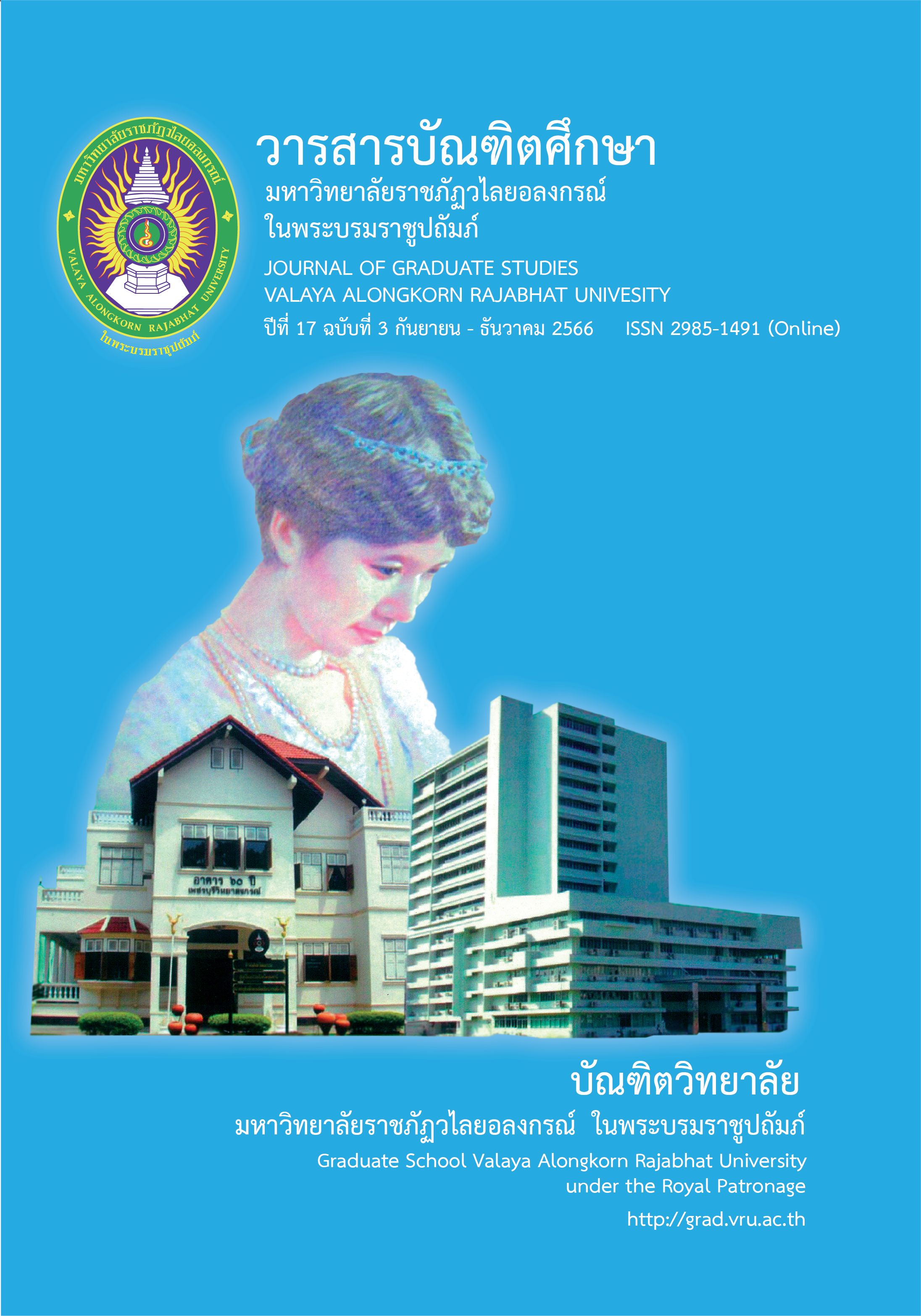COMPARISON OF THE LEARNING STABILITY AND EXPECTATION COMPONENTS OF EDUCATION SUCCESS OF UNDERGRADS IN THE COVID-19 PANDEMIC
Main Article Content
Abstract
COVID-19 pandemic effects to education system in the country particular higher education student. They will have to adopt knowledge for their career and earning in the future soon. Therefore, research aims of this case are to investigate learning stability levels, to study components of expectation, and to analyze a comparison of the learning stability and expectation components of higher education student under COVID-19 pandemic. Sample group is student held in academic year 2020 of Rajamangala University of Technology Thanyaburi for 4-year levels. They are total 424 individual respondents. Statistics technique used for data analysis are mean, percentage and standard deviation for descriptive, EFA and One Way Anova for inferential statistic.
The findings exhibit stability of student, i.e., the highest value of healthy is students who are not in risk of infection, family-more than 80% of students have not risk and anxiety to the pandemic while those living with elderly/children at low level revealed the highest, economy- spent reduced, online learning- ready to study online at moderate level, social- don’t panic and worry people around. Moreover, expectation issue was found 3 latent variables, i.e., period, future stability, and study barriers. Comparing learning stability under COVID-19 under the COVID-19 pandemic, it was found a significant difference between the period expectation and future stability based on health and society, and study barriers and economic issue.
Article Details

This work is licensed under a Creative Commons Attribution-NonCommercial-NoDerivatives 4.0 International License.
บทความทุกเรื่องได้รับการตรวจความถูกต้องทางวิชาการโดยผู้ทรงคุณวุฒิ ทรรศนะและข้อคิดเห็นในบทความ Journal of Global of Perspectives in Humanities and Social Sciences (J-GPHSS) มิใช่เป็นทรรศนะและความคิดของผู้จัดทำจึงมิใช่ความรับผิดชอบของบัณฑิตวิทยาลัย มหาวิทยาลัยราชภัฏวไลยอลงกรณ์ ในพระบรมราชูปถัมภ์ กองบรรณาธิการไม่สงวนสิทธิ์การคัดลอก แต่ให้อ้างอิงแหล่งที่มา
References
Aucejo, E. M., French, J., Araya, M. P. U. & Zafar, B. (2020). The impact of COVID-19 on student experiences and expectations: evidence from a survey. Journal of Public Economics. 191, 104271.
Corlett, R. T. et al. (2020). Impact of the coronavirus pandemic on biodiversity conservation. Biological Conservation. 246, 108571.
Cronbach, L. J. (1990). Essential of Psychological Testing. 5nd ed. New York: Happer Co; ins.
Deeod, P. (2020). phonkrathop kān phrǣ rabāt rōk wairat khōrōnā sō̜ngphansipkāo tō̜ kānprakō̜p ʻāchīp bō̜rikān čhat song ʻāhān [The Impact Spread of the Coronavirus 2019 (COVID-19) on Occupation of a Food Delivery Service]. Journal of MCU Nakhondhat. 7(6), 131-144.
Drake, T. L., Chalabi, Z. & Coker, R. (2012). Cost-effectiveness analysis of pandemic influenza preparedness: what’s missing? Bull World Health Orang. 90(12), 940-941.
Gopal, R., Singh, V. & Agarwal, A. (2021). Impact of online classes on the satisfaction and performance of students during the pandemic period of COVID19. Education and Information Technologies. 26, 6923-6947.
Krejcie, R. V. & Morgan, D. W. (1970). Determining Sample Size for Research Activities. Educational and Psychological Measurement. 30, 607-610.
Likert, R. A. (1961). New Patterns of Management. New York: McGraw-Hill Book Company Inc.
Litman, T. (2020). Pandemic-resilient community planning, practical ways to help communities prepare for, respond to, and recover from pandemics and other economic, social and environmental shocks. Victoria Transport Policy Institute, 23 April 2020; 1-29.
Nabarro, D. & Wannous, C. (2016). The links between public and ecosystem health in light of the recent ebola outbreaks and pandemic emergence. EcoHealth, 1-3.
Nicola, M. et al. (2020). The socio-economic implications of the coronavirus pandemic (VOCID-19): A review. International Journal of Surgery. 78, 185-193.
Office of Academic Promotion and Registration. (2019). Retrieved from https://www.oreg.rmutt.ac.th/
Qiu, W., Rutherford, S., Mao, A. & Chu, C. (2016-2017). The pandemic and its impacts. Health, Culture and Society. 9-10, 1-11.
Thairathonline. (2020). khāo sathānakān phœ̄i tūalēk phūpūai khō wit - sipkāo lāsut kœ̄n rō̜i māttrakān chūai khon dư̄atrō̜n [Situation News Reveals Numbers of COVID-19 Cases]. Retrieved from https://www.thairath.co.th/news/politic/1815023
Tongkeo, T. (2020). kānʻō̜kbǣp kānsưksā nai chīwit withī mai (Design - Based New Normal): phonkrathop čhāk kān phrǣ rabāt COVID - sipkāo [New Normal Based Design in Edcaiton: Impact of COVID-19]. Journal of Teacher Professional Development. 1(2), 1-10.
Ungchusak, K. & Chunsuttiwat, S. (2020). wikrit khō wit - sipkāo nai prathēt Thai: kān plīan phān čhāk māttrakān kưng lo̜kdā sū kānmī sathīanraphāp [COVID-19 Thailand: Transition from “Semi-Lockdown” to Stability]. Journal of Health Science. 29(2), 376-380.
Viner, R. M. et al. (2020). School closure and management practices during coronavirus outbreaks including COVID-19: a rapid systematic review. Lancet Child Adolesc Health. 4, 397-404.
Vuuren, et. al. (2017). Energy, land-use and greenhouse gas emissions trajectories under a green growth paradigm. Global environment change. 42, 237-250.
Wayo, W., Charoennukul, A., Kankaynat, C. & Konyai, J. (2020). kān rīan kānsō̜n bǣp ʻō̜nlai phāitai sathānakān phrǣ rabāt khō̜ng wairat COVID - sipkāo: nǣokhit læ kānprayukchai kānčhatkān rīan kānsō̜n [Online Learning Under the COVID-19 Epidemic Concepts and Applications of Teaching and Learning Management]. Regional Health Promotion Center 9 Journal. 14(34), 285-298.
Wongsongkram, S., Charupheng, M., Vorachroensri, S. & Chrruensuk, O. (2019). kānsưksā khunnalaksana thī prasop khwāmsa ret nai kān rīan nai satawat thī yīsipʻet khō̜ng naksưksā parinyā trī [A Study of Characteristics of Educational Success in 21st Century of Undergraduate Students]. Journal of Graduate Studies Valaya Alongkron Rajabhat University. 13(1), 167-179.
Worldometers. (2020). Coronavirus. Retrieved from https://www.worldometers.info/coronavirus/country/thailand/


